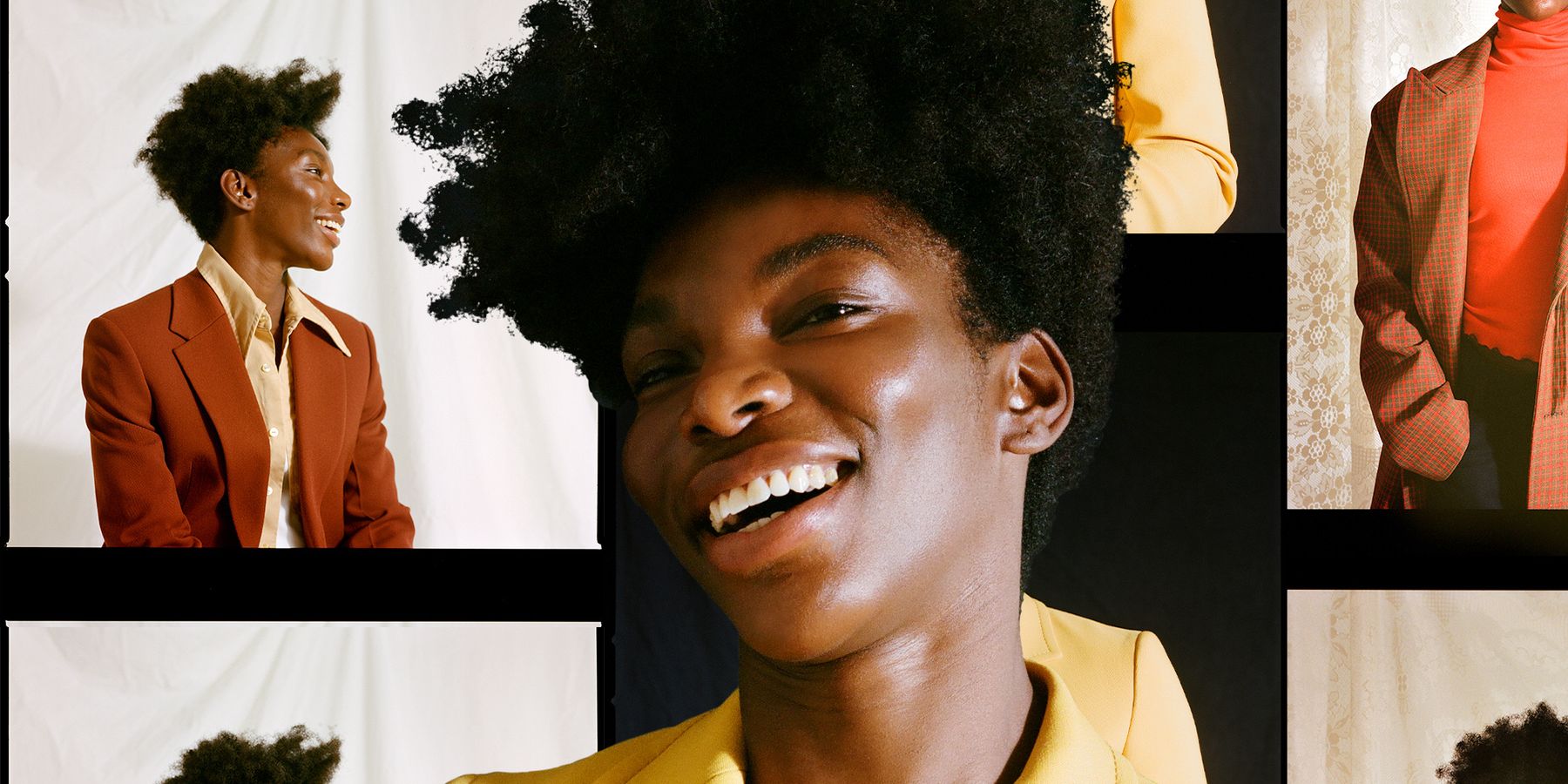
Michaela Coel Looks Beyond Binaries With 'I May Destroy You'
Story by Bolu Babalola / Photography by Ekua King / Styling by Candice Bailey / Hair by Charlotte Mensah / Makeup by Bernicia BoatengJul 20, 2020

This article is a sponsored collaboration between HBO and PAPER
Michaela Coel speaks with deliberate, crystalline clarity. When she thinks, she stills, looking away as if to allow space for the movements of her thoughts — as if to avoid disrupting them as they fall into their place. And they always do; when expressed, her thoughts are always heavy with the fullness of considered intent and meaning.
This manifests itself within the work of the 31-year-old, BAFTA decorated, creator of the two, creatively athletic and incisive outfits, 2015's Chewing Gum and this year's TV show of the year (I'm calling it) I May Destroy You. Her storytelling is sharp, thoroughly formed and vibrant, intricately elegant in the way it takes us from light to dark, brightness and bleakness melding to form a thematic dyad within the worlds she conjures.
I May Destroy You is often billed as a consent drama, but this need to plainly categorize somewhat flattens the richly textured series, and balks against the multiplicity that the artist and her art represents. While it focuses on the stark and unequivocal wrong of the sexual assaults protagonist Arabella experiences, I May Destroy You also explores the capabilities of badness we all carry as humans — how wrongness can be something that contracts or stretches depending on a lens that often switches like a kaleidoscopic telescope, directed under rapidly changing spotlights.
The British-Ghanaian writer challenges us to re-imagine our conditioned notions of good and bad — to be curious rather than afraid when we find ourselves situated within the grey area, and yet, there is no ambiguity when it comes to her vision itself. She wants us to question.
I sat down with Michaela Coel over Zoom to break down this clarity in creative vision, the power of constant curiosity and how looking beyond binaries opens us up to empathy.
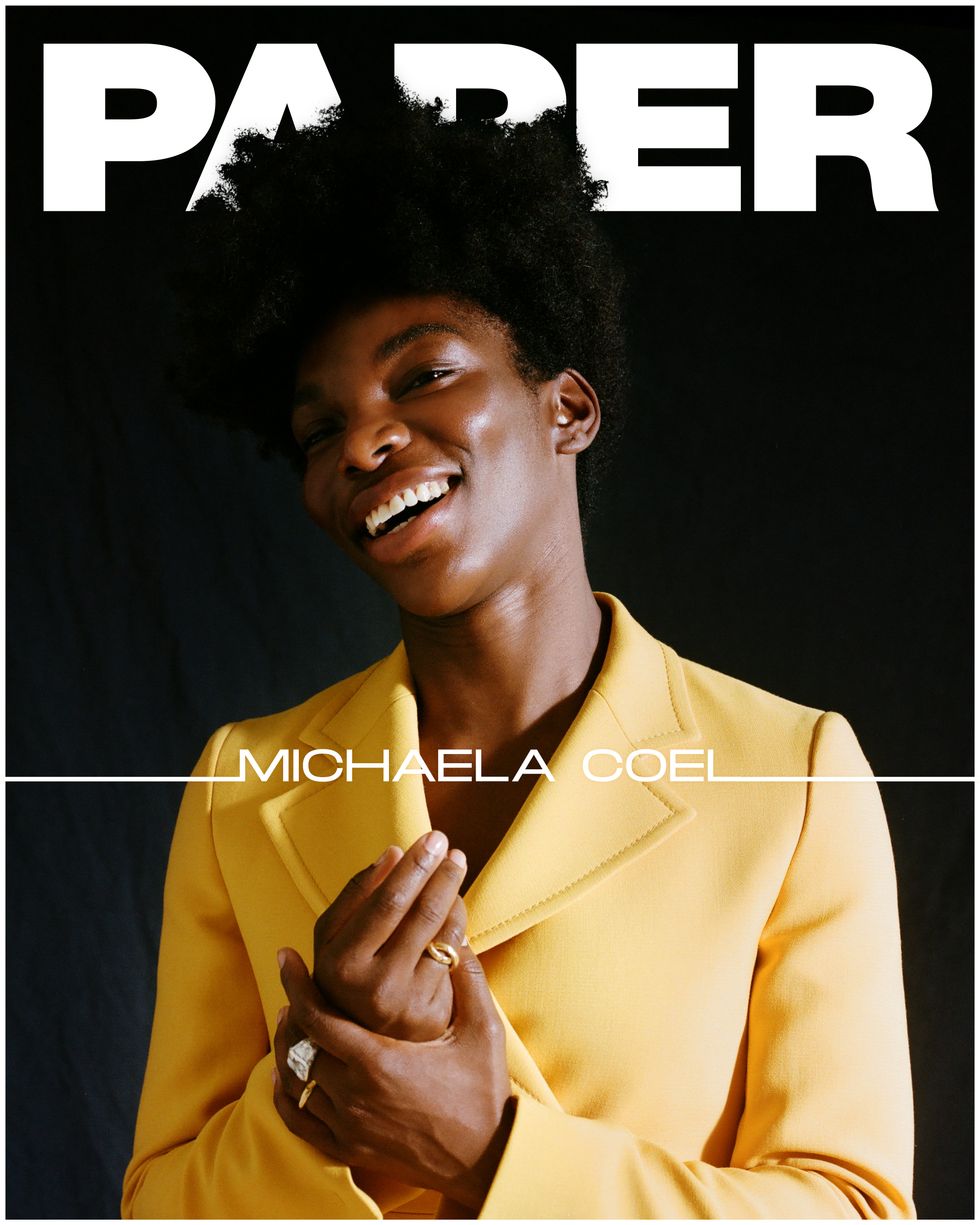
Coat: Prada, Rings: Alighieri
First and foremost, how are you doing Michaela?
Day by day, I'm doing okay. In the UK it's the final week of the show, so I'm emotional [laughs]. I'm happy, I've got my plants. I'm looking after things other than myself. Doing puzzles. Seeing family a lot.
Did you find that writing such a personal show was therapeutic — almost like a catharsis and purging of emotion?
It felt like all those things. I was surprised to find myself emotional while I wrote it, but I find that's what happens in therapy a lot. It was cathartic. You know, therapists often advise their clients to journal. This felt like journaling very specifically about a traumatic event and then fictionalizing it. The therapist will tell the client to re-enact a scene with their dad, pretend that the dad's there. It was very helpful for me in that way.
These emotions that have been close to you for so long have now been released to us — and we are grateful — but how does it feel now that people have access to those innermost, intimate feelings?
It was the same with Chewing Gum — I call my shows my babies, whether they're inspired by my life or not. So I always have to stress the show is largely fictional, but still it's my baby, right? However, there's something that happens with I May Destroy You, as it airs weekly. It's almost like it's continuing to create itself, simply by meeting the world. It's weird to watch it unfold. I've done my job and it's continuing on, on its own — even down to how the audience interpreted the title. I didn't realize how the title could be a trigger warning itself.
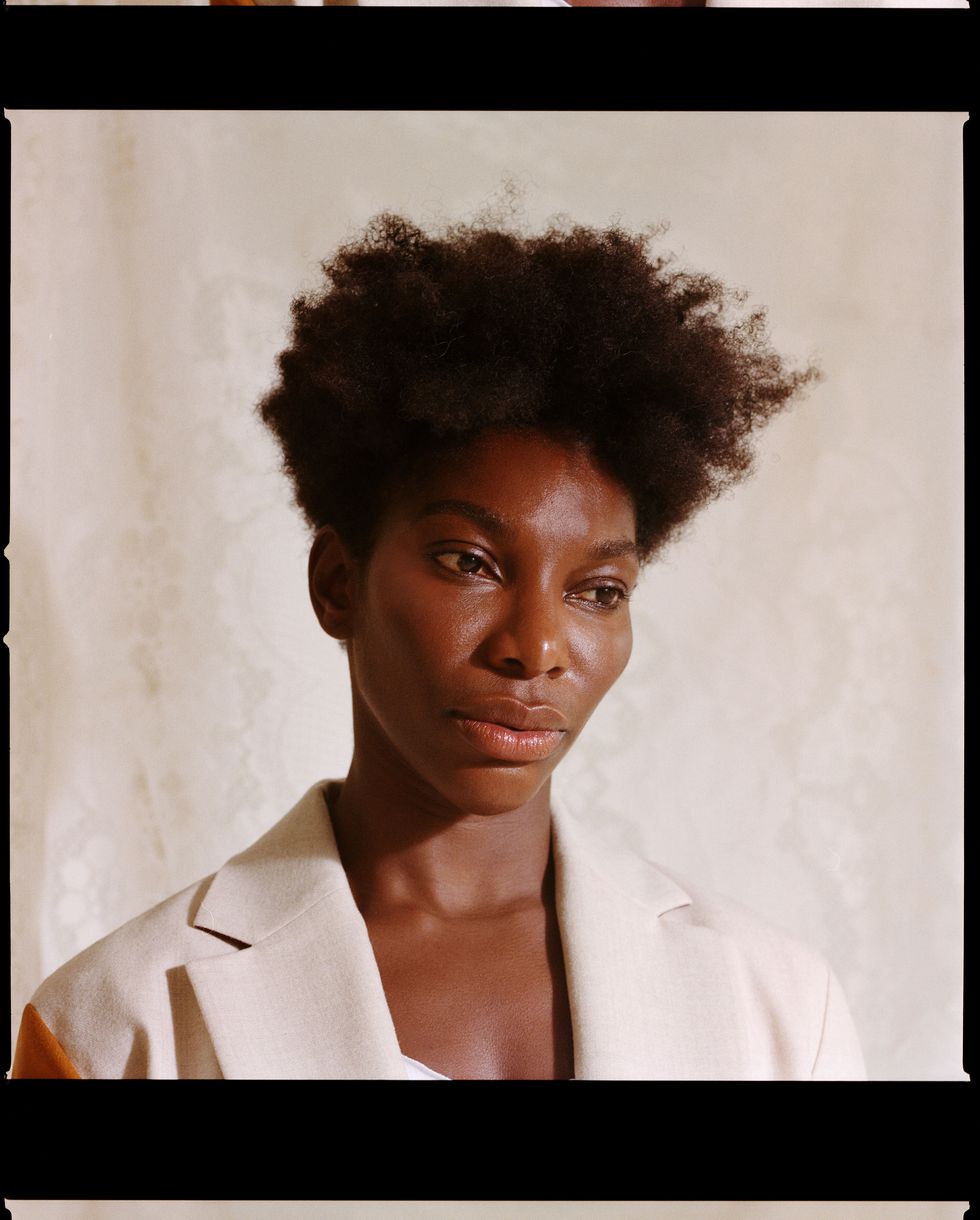
Blazer: Roksanda, Vest: ACNE Studios
It's funny how there are dimensions to your art that you don't realize exist until it reacts with the atmosphere and the audience. You mentioned Chewing Gum; a very different show to I May Destroy You. Chewing Gum is comedy with a darker core, whereas I May Destroy You is dark with moments of levity. However, the veers from drama to humor in both shows never feel jarring. Is elasticity with genre something that knowingly informs your work?
Yes. Chewing Gum Dreams — the play which the show was based on — was very similar to I May Destroy You. The play was much darker than the TV show, however, there was also a lot of comedy. I was trying to bring light in with the dark. I think that's natural to how I choose to create because one can't exist without the other.
I can't help but think about the show from the context of being a Black-Brit. What I love about both I May Destroy You and Chewing Gum, is that it's a culture we haven't often seen on television. We have never seen Black-British millennials in this way. I've noticed in the most traumatic of moments, there is always a jolt of humour. For example, Terry snapping "Why are you shaking for?" when Arabella has realized something traumatic. I burst out laughing. As natural as it is to you, do you think our culture has, in a sense, helped to shape the way you write?
[Laughs] Terry's line came very naturally. I'm always looking at the context of things and maybe that actually speaks to something about our lives here [in the UK] as children of immigrants. We're always looking at the context in which we sit, aren't we? It feels like a totally unconscious release as I'm typing.
Social media is a prevalent theme in I May Destroy You. As I was watching, I realized how social media can actually destroy so many parts of us if we allow it to. The show also comes at a time where the concept of "cancellation" is dominating cultural discourse right now. How do you interact with it?
Yes, and we see it in Episode 11 of I May Destroy You where Nilufer tells Kwame that he's cancelled. I think this is a world in which many of us feel powerless, right? And I think cancel culture is often a way of us trying to find and exercise our power. I'm interested in how and why we feel so powerless that we look to social media — this portal in a virtual place to be powerful. Why is it the only place most of us find power? What is going on in the world that we live in right now? Why is this the only place we feel like we have power and where justice might be done? We're fulfilling a fantasy of trial and retribution and justice there because it doesn't really exist in the real world. And if it did exist, would we be doing that? I'm interested in why this is all we have.
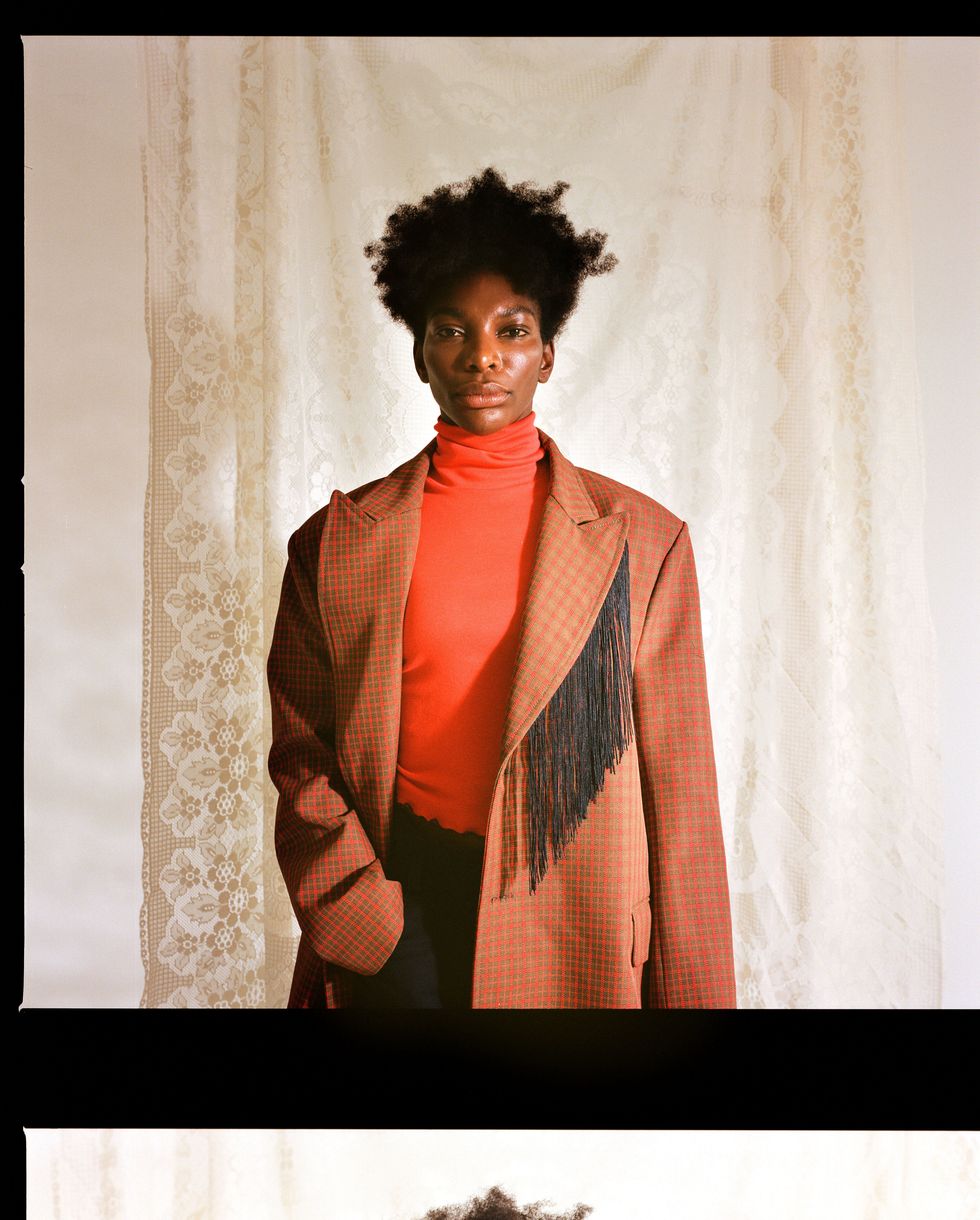
Coat: Preen by Thornton Bregazzi, Top: Stylist's own, Shorts: Dhenze, Rings: Alighieri
Do you think it's something to do with the fact that because for so many voices in the margins who have been excluded from traditional platforms, it provides a platform to elevate themselves?
I feel that social media has capitalized on those in the margins — on us in the diaspora, full stop. We are trying to find each other all the time. So social media has brought us together and it's a great positive side to social media. You can use it to communicate in a way that can band the diaspora together and allow us to feel connected. That's incredible. But there are pros and cons to everything, right? So what are the downsides? I think we're ignoring the downsides and I think it's very challenging for us to watch that unfold. Because they're real, aren't they?
Incredibly. And I have to say, that part of the show really struck me. All those voices in your space, all the time, at the same time, projecting onto you. When you step back from it you realize how abnormal that reality is.
Exactly. I've had chats in interviews where people say, "Arabella wouldn't have had that first book had it not been for Twitter," as if they're triggered by the fact that she deletes social media. And I can see they're probably on social media too. All I'm saying is take a break. It's a drug. It does things to our brain, to our receptors. This is a reality that I live in. It's affected me and it affects all of us. I just think that while we get all the benefits from this drug, we should learn to not be addicted to the drug, to not let the drug consume us so we end up building our lives around this drug. People ask, "How do we spread information? With all these killings and police brutality, we need social media," but it's like, no, because before social media existed, there were viral videos of police killing people — Rodney [King]!
And the riots still happened.
You know what I mean? We're going on as if the only way that we can do it is through this addictive drug. We managed protests long before Twitter existed, but now we're being sucker-punched. We can't imagine our lives without it. I think we should start exploring, practicing doing things without it as well as with it.
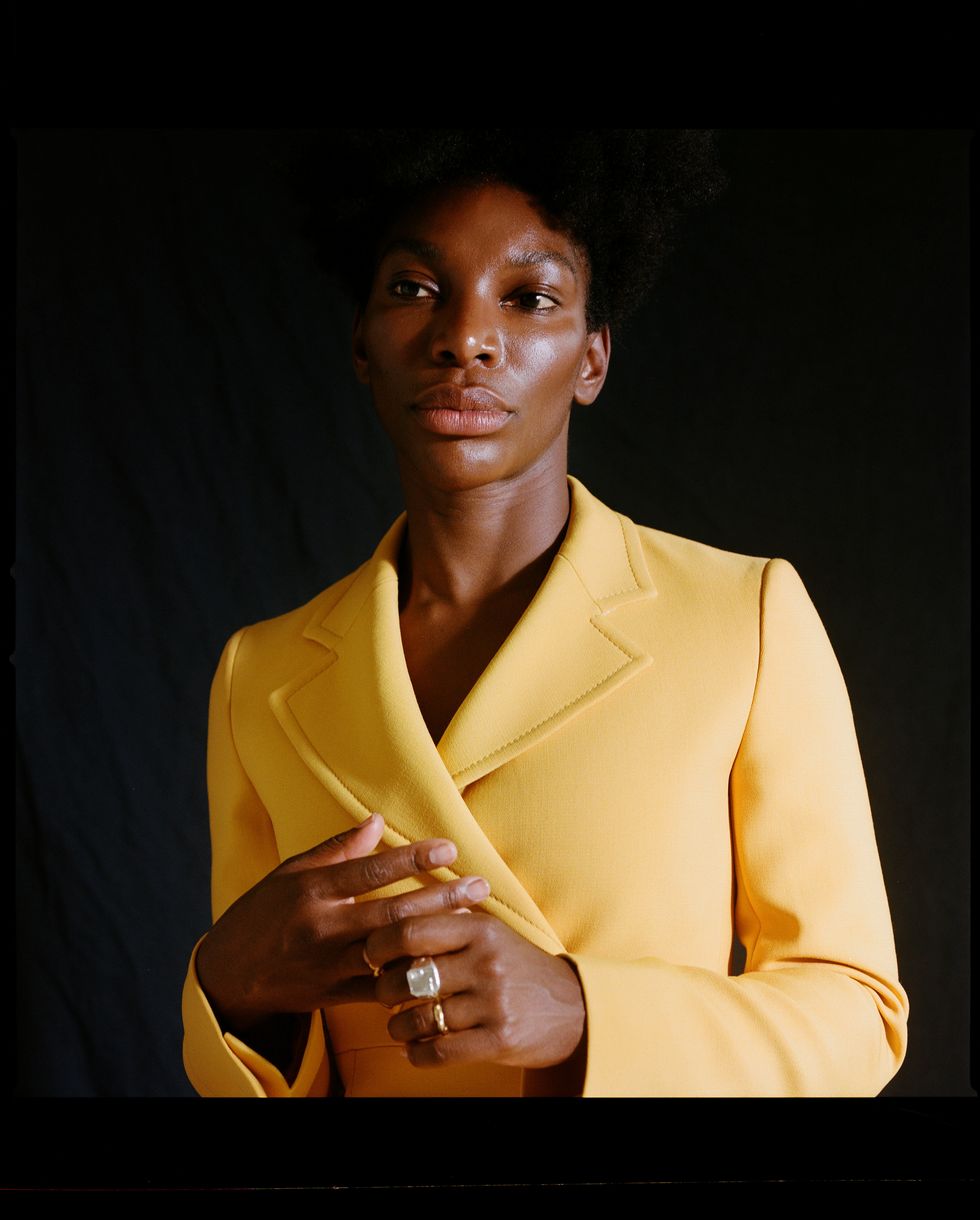
Coat: Prada, Rings: Alighieri
Earlier, you mentioned Kwame being cancelled by Nilufer. What I love about I May Destroy You is that you acutely explore light and dark, and the grey areas and the boundaries. Kwame was such a great use of that, as by the point where he sleeps with Nilufer, we love him, we know him, we care about him. Paapa Essiedu is incredible in his portrayal. Kwame crosses a boundary in which the ethics shift according to light and perception. It challenges and it is never didactic. We're never really pointed to good or bad. Is this something you are particular with, when writing?
Yes. I think because I was creating different characters and they're all coming from me, it meant that I empathize with them. It meant that these conversations were created [in a space] where the audience would be able to see multiple perspectives, which I think is very much denied to us these days. It's very hard to imagine both sides of an argument and be in the shoes of the other person. So, because they're all coming from my head, this was the result. I wanted the opportunity for the audience to understand where both people are coming from at once, just to see what that looks like. I'm never trying to teach the right answer because I don't know if there is a right or wrong with these specific interactions. I'm not talking about the sexual assault or stealthing, but with Nilufer and Kwame, for example, there isn't really a right or wrong. There's two people who have done some amazing things and some questionable things. And that's an experience that needs to be explored. I want the audience to ask themselves, "How are you supposed to feel?" And that's what I want them to feel.
It triggers critical thinking. Going back to social media, we're used to a good and bad binary within our media. If something isn't what we consider good, then it's terrible. And this show blows that whole idea into pieces. This loops into the notion of projecting onto people; people go up to Arabella in admiration all the time, and she embraces them and allows them to share her pain. And when you contrast that with how Arabella looks up to Susy Henny, who doesn't exactly turn out to be the Big Sister she expected her to be–
[Laughs] Susy!
I love Susy. She's really scary.
She's really scary. And the thing is, Susy is that big sister. She says in Episode 7, "Once I'm a fan, I'm a fan." And Arabella soon realizes that statement doesn't just apply to her. Susy is a real mother. She will mother everybody. I think she wants Arabella to practice questioning. So when she asks her if she sees race as a rational taxonomy, she means, are you going to explore whether race is real or not before understanding your place as a Black woman? Can you practice the art of questioning Black itself, only to come back around to understand you are Black?
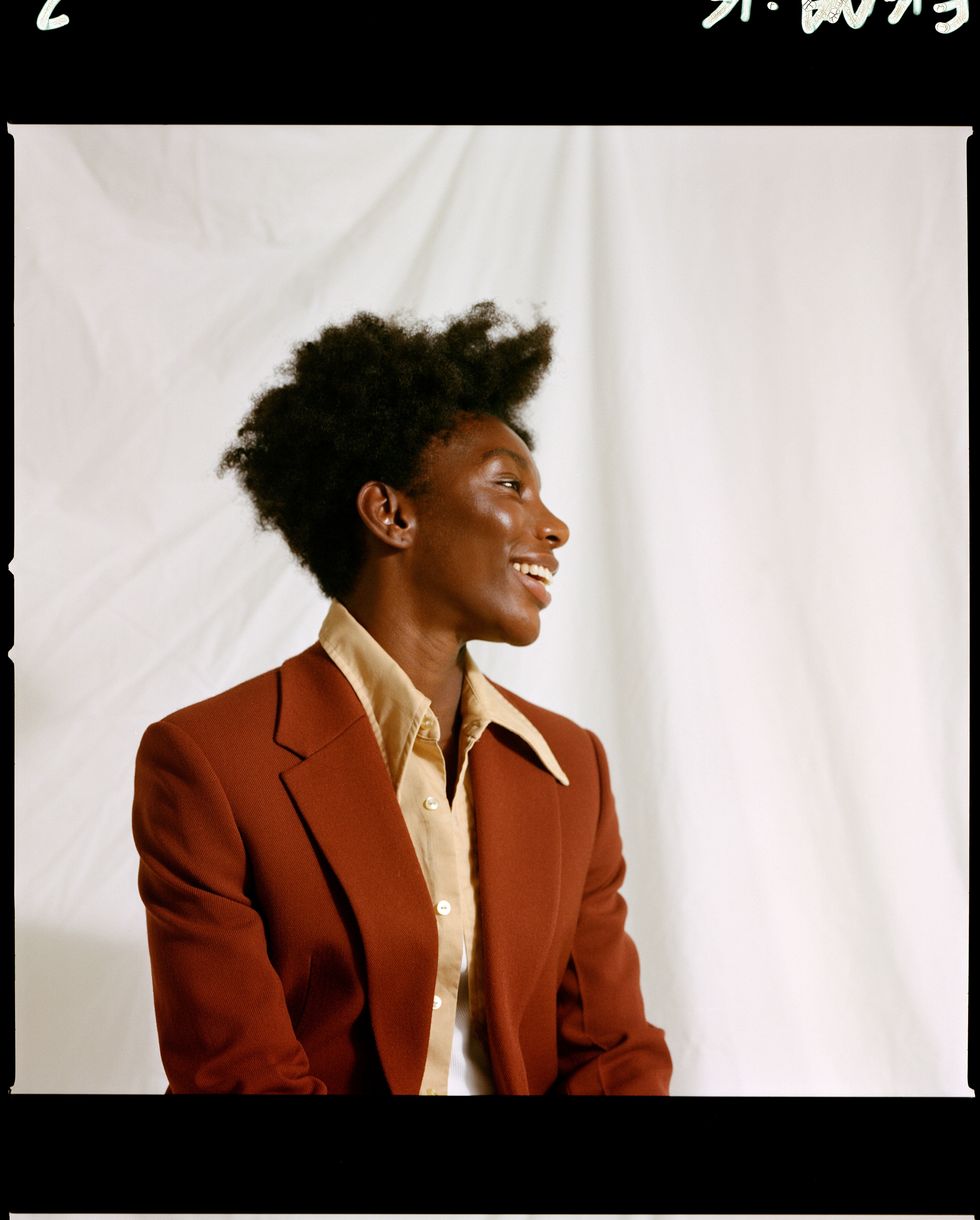
Jacket: BOSS, Vest: ACNE Studios, Shirt: Stylist's own
It's an example of how all our expectations are upended throughout the series.
There's two films that were instrumental for me in creating the show: Leviathan and Loveless by Andrey Zvyagintsev. In Loveless, there is a line that says, "You are God and the devil rolled into one."
In light of that, how do you respond to the pressure and the status of "role model"? There aren't many Black-British women with your visibility, and so people will naturally cling and project onto you as a reflection of possibility. How does that notion interact with you?
Within the online world there's a level where I have to accept that. These apps are created to flatten, and it means that the internet may have an idea of me that is just "good." [I want people to] understand that I have flaws; I'm a full human. I never take too much of it on. I don't drink the Kool Aid [laughs]. It would be dangerous for me to take on any view of myself that is not mindful of the fact that I have the potential to cause harm, as well as to cause good. And that's why I spend a lot of time always remembering who I am so that I can make sure that as I conduct my life, I'm trying to be the best human, I'm trying to be socially responsible. And to do that I have to understand that I have the potential to be a dick.
Like everyone does! Is this consciousness of who you are, something you're conscientious about when creating your work — paying attention to your fullness?
Yes, even down to the way I'm engaged with my team. I'm very open. I'm constantly trying to understand and trying to be understood. And communication is what storytelling is. I understand that I might not always be as clear as I think I am. So I'm always very conscious to work with other people and to have people around me who are honest enough to say, "I don't understand what you mean."
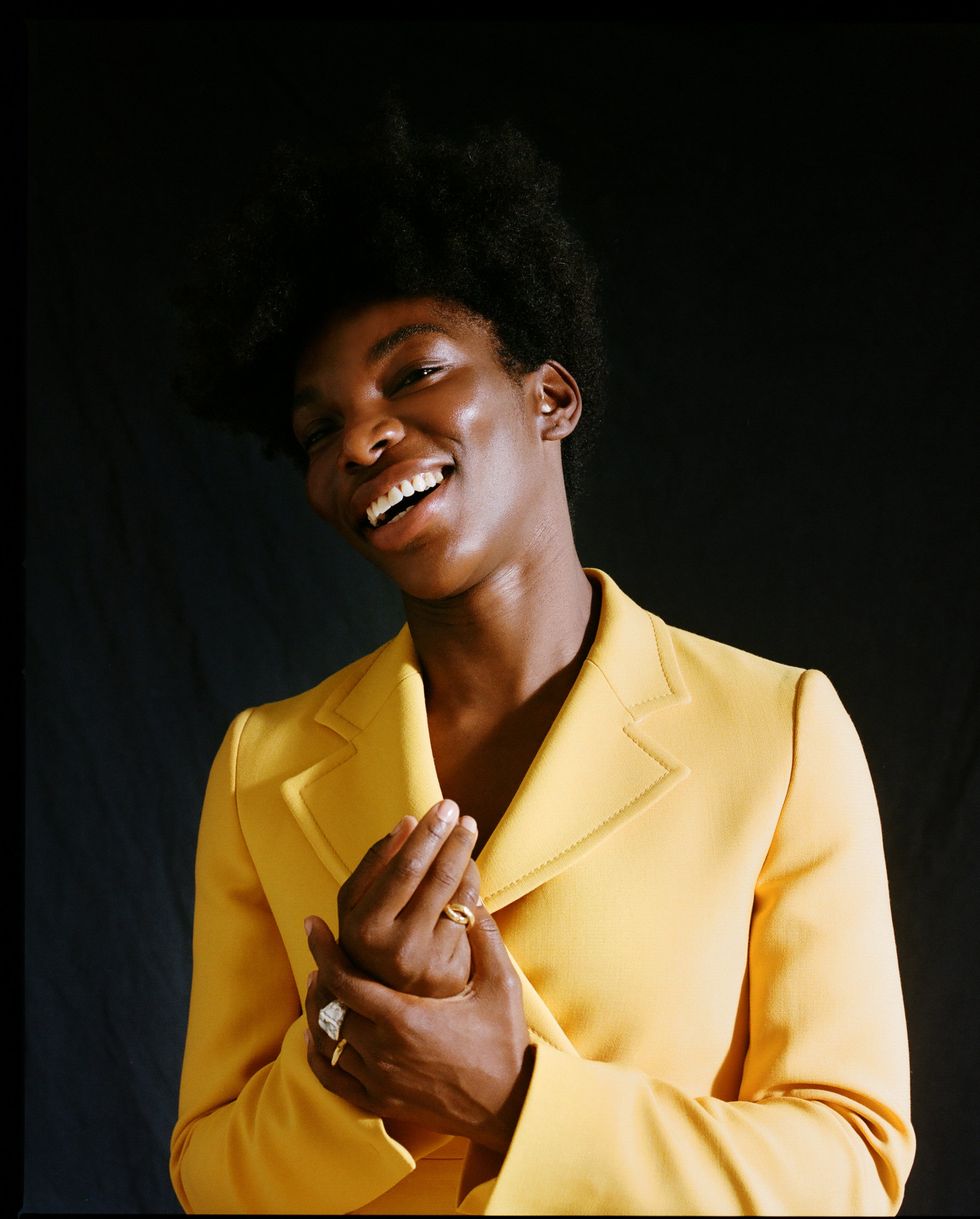
Coat: Prada, Rings: Alighieri
Is there a difference for you in writing for TV and writing for stage? Do you miss it at all?
It's the same in terms of sharing vulnerability and trauma. With stage, there's anxiety but there's also a huge amount of reward. When you have an audience, they laugh when you want them to laugh, go silent when you want them to. But when I met up with my co-exec producers who'd just read a draft, they explained that they went through all those emotions I wanted them to have. So I don't necessarily miss it because I feel very fulfilled in what I'm doing right now. I'm sure I could go and do theater again someday. It would give me the same feeling; I just love what I do, whatever I do.
As a viewer you feel that. I May Destroy You is art filled with love, and it moves and stirs with that power. Is there any kind of art that has moved you in that kind of way?
I remember watching Boy Blue, a beautiful dance crew. I saw them perform in Royal Stratford East. I was working as an usher, ripping tickets for people as they came in. As they performed, I was crying at this really sad part of a little boy dancing. I remember thinking, How have they been able to make me feel this? They didn't even have words, just dance and music. So I was aware then that a performance could really stir me. Also, Buffy the Vampire Slayer! There's an episode where she dies and I cried as if my mum had died. I couldn't even speak. I went to my sister's room and she saw me in floods of tears. She panicked and asked me what was wrong, and I said, "Buffy's dead!" She told me to get the hell out. Of course, films like Leviathan and Loveless. I appreciate being provoked. Even, Shakespeare! Good literature, songs, poetry.
Have you found the time to read now?
I am reading a powerful book of poetry by a young man Caleb Femi. Oh my God, he has a book called Poor and he's just stirring me. Destroying me. I look up to him as a poet. And I'm reading the third book in a trilogy. It's called The Three-Body Problem, and the third one is called Death's End; it's Chinese Sci-Fi.
I like that your taste veers through genre and tone like your shows. Is there anything you're striving towards? Or do you go where your creative fluidity takes you?
Definitely that. I'm living in the present [laughs]. I think I should practice making goals. Maybe I should journal. I wonder if I could achieve even more by making a fucking plan.
I mean, you don't seem to be doing shabbily without them.
You know, I think recently, I've been trying to understand. I'm trying to show up for my friends. My friend was telling me about this thing called love languages. I don't know if I believe it or not. But what she said is that she likes acts of service as an expression of love. So although I don't have any love language, I recognize that she needs to need me to do things. So now I'm practicing, I want to show up for my friends. That's my goal.
Catch up on the series everyone's talking about. Watch the first two episodes of I May Destroy You free on HBO's YouTube channel now through 7/26. New episodes Mondays at 9 PM on HBO and stream it on HBO Max.
Interview: Bolu Babalola
Photography: Ekua King
Styling: Candice Bailey
Hair: Charlotte Mensah
Makeup: Bernicia Boateng
Photography assistant: Arthur Comely
Styling assistant: Jade Hennessey
Manicurist: Charley Avenell